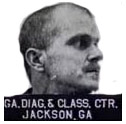
Tests Could Prove Innocence of E. Wayne Felker, Executed in 1996
By William Kreuter and Hans Sherrer
The news media have finally started to pursue one of the likely cases of
execution of the innocent. CBS' "60 Minutes," the Boston Globe, the Atlanta
Journal Constitution and the Macon (Georgia) Telegraph have requested DNA
testing of evidence in the case of E. Wayne Felker, executed in Georgia in
1996 for a 1981 rape and murder of Joy Ludlam. Felker's conviction was
obtained through hair analysis, which is notoriously unreliable, and by
claimed similarities between the Ludlam murder and another crime for which he
was convicted years earlier. Disregarded by appeals courts were boxes of
evidence that the state hid from Felker's attorneys until just before the
execution. Some of these held exonerating evidence, including another
person's confession and the materials now to be DNA tested. The courts also
ignored the fact that Felker had been under constant police surveillance
during the period when forensic evidence confirmed that Ludlam, who was
missing for two weeks before her body was found, must have been alive. The
autopsy was performed by an unqualified technician who made false statements
about its results.
A Georgia State court judge and the county district attorney have agreed to the testing. Results should be known within some months. The DA, state officials and Ludlam's survivors continue to insist on Felker's guilt.
(The portion above written by William Kreuter)
It was first reported in the 1987 Stanford Law Review article, "Miscarriages of Justice in Capital Cases," that at least 23 innocent people are known to have been executed by the legal system in this country from 1900 to 1987. That averages to the execution of more than one innocent person every four years.
Typically, however, the quest to prove someone's innocence ends with that person's death or execution. In an exception to that rule, CBS News and three newspapers have offered to pay for DNA tests that could prove the innocence of a man executed in 1996.
The executed man, Ellis Wayne Felker, claimed he wasn't guilty of the 1981 rape and murder of 19-year-old college student Evelyn Joy Ludlam in Houston County, Georgia.
The doubts about Mr. Felker's guilt are convincing enough to induce The Boston Globe, The Macon Telegraph, the Atlanta Journal-Constitution and CBS to pay the costs of the DNA tests that could conclusively prove whether or not he was the wrong man.
The tests would be run on physical evidence the authorities have kept since the murder 19 years ago. Among the tested materials are hair samples from Mr. Felker and Ms. Ludlam, tissue imbedded under her fingernails and hair found in Ellis Felker's residence.
Houston County prosecutor Kelly Burke has called conducting the tests "a total waste of their time." The testing by a California laboratory, however, would reopen the case and the search for Ms. Ludlam's killer by establishing Ellis Felker's innocence if it finds in Felker's favor.
If exonerated by the tests, Mr. Felker would be the first man proven innocent by a DNA examination after the wrongful conviction and execution. The tests, however, are significant even if they are inconclusive. They would not have been seriously pursued by reputable news agencies if it weren't for the elevation of consciousness that has occurred over the past several years about the unreliability of trial courts to distinguish the guilty from the not guilty, and to otherwise ensure that a defendant receives a fair trial.
The next issue of Justice Denied will have a report on the historic 9-year Columbia Law School study released in June 2000 that documents the 68% failure (reversal) rate of trial courts in death penalty cases nationwide from 1973 to 1995. Ellis Wayne Felker may have been one of those failures that wasn't corrected in time.
(The foregoing portion contributed by Hans Sherrer)